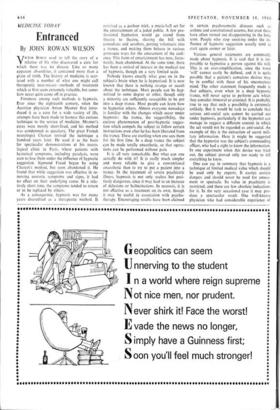Unnerving to the student
in certain psychosomatic diseases such as asthma and constitutional eczema, but even these have often turned out disappointing in the long term. People who stop smoking under the in- fluence of hypnotic suggestion usually tend to start again sooner or later.
Various general statements are commonly made about hypnosis. It is said that it is im- possible to hypnotise a person against his will. This is an over-simplification, since the word `will' cannot easily be defined, and it is quite possible that a patient's conscious desires may be in conflict with those of his unconscious mind. The other statement frequently made is that subjects, even when in a deep hypnotic trance, will never agree to perform acts which they consider immoral or criminal. It is probably true to say that such a possibility is extremely unlikely. But it would be rash to conclude that serious anti-social acts cannot be carried out under hypnosis, particularly if the hypnotist can manage to suggest a different context in which the act would not be regarded as anti-social. An example of this is the extraction of secret mili- tary information. Here it might be suggested that the hypnotist was the subject's commanding officer, who had a right to know the information. In one experiment when this device was tried out, the subject proved only too ready to tell everything he knew.
One can say in summary that hypnosis is a technique of limited medical value which should be used only by experts. It carries certain dangers and should never be used for amuse- ment or spectacle. Its value in psychiatry is restricted, and there are few absolute indications for it. In the very occasional case it may pro- duce a spectacular result. One well-known physician who had considerable experience of
n a world where reign supreme
Never shirk it! Face the worst!
E vade the news no longer, S imply have a Guinness first; Soon you'll feel much stronger!






























 Previous page
Previous page